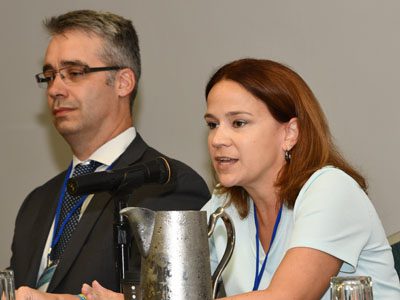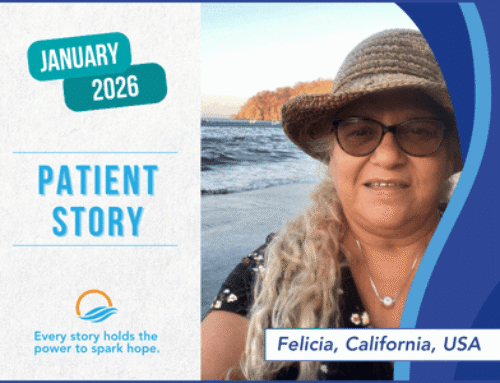
Dr. Breelyn Wilky answering questions on a panel of GIST experts at Life Fest Miami, 2018.
Colorado, Clinical Trials & Immunotherapy
Dr. Wilky, Director of Sarcoma Translational Research at the University of Colorado, broke for a few minutes from her jam-packed schedule to talk with The LRG about her move from Miami to Colorado, designing clinical trials, and immunotherapy for sarcoma and GIST patients.
New Work in Colorado
When asked what precipitated her move from Sylvester Comprehensive Cancer Center in Miami to the University of Colorado Anschutz Medical Campus in Aurora, Colorado, Dr. Wilky said that her purpose in Miami was to learn how to care for patients, run clinical trials, and build her clinical skills.
“I was in Miami for five years, under the guidance of a fantastic mentor, Dr. Jonathan Trent,” said Wilky, “and I had the opportunity to design a clinical trial using immune therapy, which I never thought I’d get into.” She found that it was really important to learn why it worked and why it did not work for patients. She says she got ‘kind of obsessed’ with that and learning how to make it work for more people.
“To do that effectively, you can’t just study patients. You really have to get biopsies and blood samples, and study the tumors in mice, sometimes. I wound up asking questions that I didn’t have the ability to necessarily answer [in Miami],” Wilky said. “I wanted to switch my focus to immunology, both in the laboratory and translational work that’s designed to go from patients into the lab and then back to patients again. That translational focus is extremely strong in Colorado and I just couldn’t say no to this opportunity.”
Designing Trials
When asked how ideas for trials come about, Dr. Wilky shared that sometimes researchers are approached by drug companies with a specific interest, but more often the ideas come from patients. The idea for Wilky’s recent clinical trial in Miami came about because a patient with an exceeding rare sarcoma walked into her clinic in 2014. She commented that these types of encounters can give you the motivation, or an idea, to try something different or to put together a trial or combination of approaches of which you might not have thought.
“I think in GIST, we’re learning more and more about how patients respond but there might be a patient who does really, really well with a particular treatment, and then you study that patient in detail, and you find out ‘this worked for a patient because of this’ and that’s how ideas for trials can happen, too,” said Wilky.
The infrastructure needed for monitoring a clinical trial, analyzing the data, and making sure that patients are protected is very expensive.
“Clinical trials are really expensive, not so much the drug itself, because that’s often a big cost, but,” said Wilky, “the process of enrolling patients. There’s a tremendous amount of support needed to make sure that patients are protected in clinical research. That they are not being used as guinea pigs and are not getting a treatment that’s unlikely to help them or too risky.”
Funding for the trial has to be secured. The drugs may come from a pharmaceutical company, though some drug companies may not have sarcomas and GIST as high priorities for drug development because they are so rare. An agency like the National Cancer Institute (NCI) has programs where you can submit an idea and if they agree with the premise, they may help supply the drugs for the study. Another avenue is to try to use standard-of-care drugs when possible, as these are often covered by insurance companies may be made available from this source.
Dr. Wilky explained her timeline for the trial in Miami and how that compares to a normal timeline to get a trial started.
“It depends on how complicated the study is and what obstacles and roadblocks you hit along the way. For example, for the study we wrote in Miami, I had to write a proposal for the drug company and that was in October of 2014. Then it went back and forth with the drug company with their edits for a time. Once we were in agreement, we had to go and get approval from the FDA. We had to write the trial, get it approved, get the budget, get all this stuff done, and then the first patient started in March of 2016. That was basically a year and a half, and that it was really fast. Most of the time it takes a couple of years to get a study from idea to patients in trial.”
Once each phase of the trial is complete, the process begins again. In the Miami trial, the results were amazing – over 50% of the sarcoma patients involved had shrinkage of their tumors. Compounding that success is the fact that it is the first report of immune therapy working for that particular sarcoma. However, sometimes, even when the data is exciting, there is additional expense in taking a drug forward to the FDA for approval.
“There are a lot of reasons why trials that you think look promising may not be approved. This is what is so frustrating for patients. The process of getting from an idea or laboratory findings to a patient and then having it be approved so that a patient can actually have access to it is not only a long and expensive process, but it’s also one that’s very prone to failure at many times along the way. This is why cancer research is challenging and we have not found a cure for many cancers thus far,” said Wilky.
Fortunately, Dr. Wilky confirmed, patients participating in a trial, such as the one in Miami, can continue on the trial treatment, “We allow patients to stay on the trial as long as it’s helping them. Patients that benefit could stay on until it stopped working or until they had to come off for some other reason. We still have one patient who is getting treatment on the study (Miami). But for most patients the drugs simply stop working, so the study is not a cure. This is true for most studies but in general drug companies will make drugs available for patients even after the studies are over if they are still benefiting. Most people have to move onto other treatments.”
Where is Immune System Research Going?
Our immune system is designed to be adaptive. It’s designed to learn and remember and change. Chemo drugs are not. Chemotherapy and chemo pills are not designed to change over time, but cancer cells do change over time.
“The one thing that might be able to keep up with your cancer cells is your immune system, but it needs help. To basically that’s what I want to learn – how to figure out how to make the immune system work better in fighting the cancer cells,” said Wilky. “It’s truly a field where the knowledge is changing on a daily basis. It’s so exciting and gives us so much hope for the next five to ten years,” said Wilky.
Dr. Wilky said there are multiple trials in the works, but nothing that is GIST specific right now. She would say they are designing future trials using immunotherapy and continuing to focus on biomarkers, so basically, looking at biopsies and blood samples to try to make treatments better. There’s also a lot of interest in new types of drugs, new types of treatments; such as cancer vaccines, and CAR T-cells research as another type of immune therapy for GIST and sarcomas.
On Staying Positive for Patients & Their Families
“There are good days and there are bad days as with anything. To see a patient without treatment options and then to come up with a clinical trial or a laboratory experiment testing your ideas and see it help someone, that is the coolest, most amazing experience I’ve had as a physician. I try not to let myself get caught up in the failures. Though I try to help everybody there are patients that I can’t help and you have to focus on the people that you did help and on keep trying to make it better for more people. For me, the key is to be involved with the research because that’s where the hope is. For most sarcomas in the metastatic setting we don’t have good treatment options. The only way we’re going to make things better is through clinical trials and research. That’s what keeps me going.”
For further info on immunotherapy:
“The Immune System in GIST and Implications for Future Therapies” – Dr. Wilky’s presentation at a GIST Day of Learning Miami in 2017. https://www.youtube.com/watch?v=MIn39piCLWI
“Checkpoint Inhibitors and Sarcomas: ASCO Offers Insights Into What to Expect and Why There Is Optimism” from The GIST Cancer Journal Interview with Dr. Wilky, https://liferaftgroup.org/wp-content/uploads/2019/02/GIST-v3n2_7.22.pdf
Clinical Trial Q&A
www.conquer.org/profiles/breelyn-wilky-md
Dr. Wilky, Conquer Cancer video youtu.be/gcpa3bXSOLA

